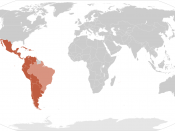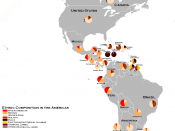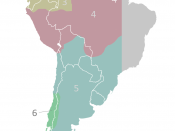Using The Faces of Honor as a reference, explain why honor was important and how it was defined and defended in colonial Latin American.
Honor has been the bridge of many passions throughout the world and especially in Colonial Latin America. The real power of honor comes from its pervasive nature, the way it transcends class and race. "Nobles and commoners alike strove to maintain honor, simply defined as ones self-esteem as well as public esteem other members of society bestowed on an individual."ÃÂ (Burkholder 18) The rise of honor was comparable to the rise and fall of power and just as control was the key to governing honor was the foundational cornerstone to colonial Latin America. Honor was so influential in the Culture of colonial Latin America, that it significantly influenced politics, education, and the rise and fall of power.
The first confounding influence to local politics was that in the beginning only wealthy ambitious individuals could afford passage to Latin America.
"In contrast less than one percent of the population of Andalusia, a common origin or emigrants to the Americas in the sixteenth century, was noble."à(Burkholder 19) The result of this new open nation was that individuals that represented the social classes could easily bridge the dichotomy between. ""æFollowing criteria: legitimate birth; nobility by birth and not by royal concession; purity of blood; religious orthodoxy, that is, no ancestors condemned by the Inquisition; good name and reputation; having reached a minimum age; and limpieza def oficios, that is, no history of father or grandfathers having engaged in "vile"àoccupations and, in some cases, trade."à(Burkholder 21) Within this regard the ability to gain honor was contingent on many social and heritage factors.
Factors of heritage could easily be changed by gaining newfound standing through ranks given during the conquests. "Thus from the earliest days of explorations and conquest, the crown validated its responsibility to reward its servants with offices, rank, and income and in so doing encouraged the transfer of Castilian values, including an emphasis on honor, to the colonies."ÃÂ (Burkholder 23) However, these new ranks were not permanent by any stand and could actually have grave consequences to those who gained the new titles. Along with such times came newfound responsibility and consequences for failure and misdeed. "One colonial scholar concluded in a pioneering article in 1917 that "ÃÂamong the families of the distinguished classes, offenses [against] honor are only erased with the death of the guilty, and the religious profession of the injured.'"ÃÂ (Burkholder 71) This consequence could tarnish entire families with the act of one member.
Even with these dire consequences in mind it was a prevailing view that these ranks were worth reaching. "'Every one wishes to be a gentleman, to lead an idle life, addicted to the frightful vies of luxury, gamin, chicane and calumny.' In Caracas, "ÃÂno white Spaniard is a commoner but when he is poor.' A Creole "àwould think himself disgraced to owe his subsistence to the sweat of his brow, or the harness of his hands"æ Nothing, according to him degrades a man so much as labor. He believes that it is impossible to perceive one's dignity, and do honor one's ancestors, except with a pen in hand, a sword by the side, or breviary under the eye"à(Burkholder 26) With this attitude that gaining status was the bridge to freedom from manual labor and the rigors of everyday life for the common man.
One of the alleviations of this rigor was the institution that was constructed to help educate and build a knowledge base in Latin America. "Education was an important means of social advancement, for it qualified youth for subsequent employment by the crown or church. Recognizing this, colonist in New Spain and Peru sought and secured the establishment of universities in Mexico City and Lima within decades of the conquest."ÃÂ (Burkholder 37) Education was an easy way to gaining the upper edge in getting titles and getting in the cue to help foster social standing. In this way honor could be created in a way that was defensible and clear. This ability to gain social standing through knowledge is in my view one of the best qualities of honor and in the end the quality most lasting.
Everyone wanted this style of life and in more ways than one every member of this society tried to immolate it to some degree. "Those Peasants abandon a life of manual labor as farmers to have been very modest, did so to a life of manual labor as farmers or herdsmen. While they wanted a European diet, as conquerors and settlers they expected the native population to produce it for them. A succession of labor institutions ensured that natives and other laborers would in fact do so."ÃÂ (Burkholder 24) Thus through social design a culture was created out of necessity to fulfill the desires of those who seek power. To some degree it must have been difficult to justify the work required to developed agricultural systems and social ladders within Latin America.
However it was a common thing for members of families to hide the good and bad associated with the rest of the family and rationalize their decisions to further the family based on honor. "This conviction was so intense that members of the elite would deny the presence of honor in their own blood relatives "ÃÂ much less in anyone else "ÃÂ who did not meet their honor criteria. To understand the elite definition of honor is not only to explore how those at the social apex defined their exclusivity but also how they rationalized such superiority."ÃÂ (Burkholder 73) While honor was equated with superiority and was the basis in creating a class system it was a formidable opponent in an upward clime for the majority of the population.
However the real dividing line drawn in the sand with honor is that of true power. True power is developed through economic power such that you could live the lifestyle and very well support others in doing so as well. "Generosity and hospitality also characterized the noble lifestyle in the New World and similarly represented honor, for "beneficence transforms economic power into honor."ÃÂ The German traveler Tadeo Haenke who observed Lima in the late eighteenth century underscored the generosity of the Creoles who provided "ÃÂsumptuous' banquet and spent their money so freely that it brought financial ruin to many."ÃÂ (Burkholder 31) In the attempt to maintain social status it is predictable that some people would fail at sustaining their level of honor, as they had to strive to gain it in the first place.
In conclusion honor has bridged many passions throughout the world including politics and education in Colonial Latin America. The real power of honor comes from its pervasive nature to engulf the entire society, the way it trans cends class and race. Honor is incredibly difficult to attain and even harder to sustain as it fades without maintenance and can easily be wiped away by external factors. The rise of honor was comparable to the rise and fall of power thought the world and it is influence in part from the models of Spaniards and was perfected through the constant search to achieve the perfection of sustainable honor. But in the end control was the key to governing honor and control was only generated through economic superiority. So in this simplistic regard as money equaled power that power was the derivation of honor. This foundational cornerstone to colonial Latin American honor was so pervasive in the Culture of colonial Latin America that it defined an entire people.





